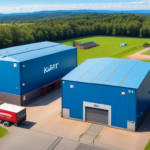Packaging Corporation of America (PCA) vs. Smurfit Kappa: An SEO-Optimized Comparison
In the competitive packaging industry, Packaging Corporation of America (PCA) and Smurfit Kappa stand out as leading companies with substantial market shares and extensive global presence. This comprehensive comparison delves into their backgrounds, market positions, financial performance, sustainability efforts, and future growth prospects.
Company Backgrounds
Packaging Corporation of America (PCA)
Founded in 1959 and headquartered in Lake Forest, Illinois, USA, PCA offers a diverse range of packaging solutions, including:
- Corrugated containers
- Point-of-purchase displays
- Protective packaging
- Paperboards
PCA operates 47 facilities across the United States and six in Mexico, with recent expansions into Asia to better serve the growing market.
Smurfit Kappa
Established in 1934 and based in Dublin, Ireland, Smurfit Kappa is one of the world's largest paper-based packaging manufacturers. Their product portfolio includes:
- Corrugated packaging
- High-quality printed packaging products
With over 350 production sites worldwide, Smurfit Kappa caters to a global clientele, emphasizing innovation and sustainability in its operations.
Market Share and Geographic Reach
Global Market Presence
Both PCA and Smurfit Kappa hold significant shares in the global packaging market. According to Statista, Smurfit Kappa has a slightly larger market share compared to PCA, bolstered by its extensive presence in Europe and South America. In contrast, PCA maintains a dominant position in North America, recently expanding into the Asian market with new facilities in China.
Financial Performance
Revenue and Profitability
In 2020, PCA reported net sales of $7.05 billion and an operating income of $928 million. Smurfit Kappa reported revenue of €9.0 billion (approximately $10.6 billion) and an operating profit of €1.4 billion (approximately $1.7 billion) in the same year.
PCA boasts a higher return on equity (ROE) of 22.5% compared to Smurfit Kappa's 16.7%, indicating greater efficiency in generating profits from shareholders' investments.
Sustainability Initiatives
Environmental Commitments
Both companies are leaders in sustainability within the packaging industry:
- PCA aimed to reduce greenhouse gas emissions by 20% by 2020 and has set a target to decrease emissions by 30% by 2030. The company invests in renewable energy sources such as biomass and hydroelectric power.
- Smurfit Kappa targets a 40% reduction in CO2 emissions by 2030 and was recognized as one of the world's most sustainable companies by Corporate Knights in 2020.
Both companies have implemented extensive recycling programs and green production processes, significantly reducing their environmental footprints.
Product Offerings and Innovation
Diverse Packaging Solutions
PCA provides a wide array of packaging products, including sustainable options made from high-quality materials. The company has recently introduced durable, long-lasting packaging solutions ideal for shipping and storage, enhanced by investments in automation and robotics to improve production efficiency.
Smurfit Kappa specializes in innovative, paper-based packaging solutions tailored for environmentally conscious consumers. They have expanded into digital packaging and customized solutions for e-commerce businesses, leveraging the rise of online shopping.
Technology Adoption
Both PCA and Smurfit Kappa prioritize technological advancements:
- PCA integrates automation and robotics to streamline production and reduce environmental impact.
- Smurfit Kappa utilizes the latest technologies and materials to develop sustainable and efficient packaging solutions, including digital platforms to enhance supply chain management.
Customer Satisfaction and Corporate Social Responsibility
Customer Feedback and Ratings
Customer satisfaction is vital for both companies. PCA is highly rated for responsiveness and product quality, while Smurfit Kappa receives positive feedback for its commitment to quality and efficient customer service. Both companies actively seek and incorporate customer feedback to improve their offerings.
Social Responsibility Initiatives
Both PCA and Smurfit Kappa demonstrate strong commitments to corporate social responsibility:
- PCA focuses on reducing waste, achieving a 95% reduction in landfill waste through recycling programs, and promoting environmental education in local communities.
- Smurfit Kappa reported a 33% reduction in CO2 emissions in 2019 and invested €60 million (approximately $71 million) in sustainability projects. They also enforce a code of conduct emphasizing ethical practices and human rights.
Future Growth Prospects
Industry Growth Drivers
The packaging industry is expected to grow, driven by the expansion of e-commerce, increased demand in the food and beverage sector, and advancements in healthcare packaging. Both PCA and Smurfit Kappa are well-positioned to capitalize on these trends through their ongoing investments in sustainable practices and product innovation.
Expansion Plans
- PCA is expanding its distribution network and investing in eco-friendly products to support future growth, particularly in emerging markets.
- Smurfit Kappa is targeting new markets in Russia and other regions, focusing on innovative and sustainable packaging solutions to drive growth.
Impact of COVID-19
The COVID-19 pandemic accelerated the demand for packaging solutions, especially in the e-commerce sector. Both PCA and Smurfit Kappa saw increased demand for their products but also faced challenges such as supply chain disruptions and logistical hurdles. Their ability to adapt quickly ensured sustained growth despite the pandemic's adverse effects.
Conclusion
Packaging Corporation of America (PCA) and Smurfit Kappa are pivotal players in the global packaging industry, each with unique strengths. PCA's stronghold in North America and higher ROE highlight its efficiency and regional expertise, while Smurfit Kappa's extensive global presence and commitment to sustainability position it as a leader in innovative packaging solutions.
Both companies exhibit robust financial performance, a dedication to sustainability, and a focus on customer satisfaction, ensuring their continued growth and influence in the packaging sector. As the industry evolves, PCA and Smurfit Kappa are set to shape the future of sustainable and innovative packaging solutions.




















